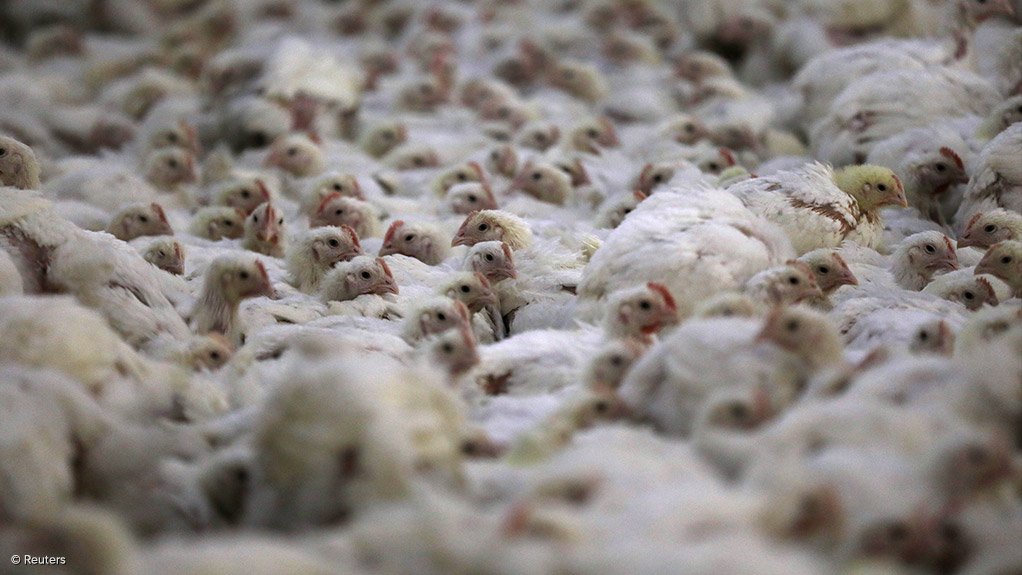Poultry industry improvements should alleviate challenges
The South African Poultry Association (Sapa) has made some “decisive improvements” to the poultry sector after a difficult year, it said on February 22.
The effects of these improvements were aimed at alleviating problems experienced throughout the entire poultry value chain by the industry over the last couple of years, such as chicken dumping, illegal imports, avian influenza and Covid-19 lockdowns.
“Although it was an arduous process, the material investments in expanding processing capacity and the construction and proliferation of poultry houses are yielding the desired results,” said Sapa chairperson Aziz Sulliman in a statement.
He said 2021 ended on a high note, with the unexpected provisional dumping duties announced against Brazil, Ireland, Spain and Denmark, which he described as a “watershed moment” for the broiler industry.
“Bone-in import volumes are expected to drop, and the industry may take up the market share in line with what was envisaged in the [Poultry Industry] Masterplan”, Sulliman explained.
In line with the tenets set out in the masterplan, the industry has invested R1.1-billion toward expanded production, mainly for emerging black contract farmers, with an additional R400-million to be invested during the course of this year.
“Contract growing has been a very useful form of transformation in the poultry industry, yet it is dramatically under-reported. Due to the guaranteed market access and the co-management model followed, very few contract growing operations fail,” Sulliman said.
In 2019, the industry directly employed an estimated 50 000 people.
“Due to industry investment, the number of individuals directly employed by the industry will increase to over 52 030 by the end of 2022 – a total increase of 1 365 jobs at a time when the industry is in decline in terms of slaughter capacity,” he said.
In 2019, prior to the masterplan, the industry slaughter capacity was19-million birds a week. In line with the R1.14-billion investment from industry, slaughter capacity has increased to 22.5-million birds a week.
The industry has, so far, created a nearly 10% increase in capacity for black farmers. It has provided R343-million in finance to cover the cash flow for black farmers, which will increase to R466-million this year.
Since 2019, R570-million has been spent on building poultry houses. This figure will increase to R750-million by the end of this year, Sulliman said.
Owing to the advent of avian influenza, 14% of all breeder birds were culled, he lamented. With the resulting reduction in total slaughter numbers, the industry is not using all of its newly created capacity.
Sulliman noted that the expansion of local demand and urgent attention to the promised export drive were required.
“Exports are high on the priority list for 2022. We want to be export-ready by the end of the year,” he said.
In 2019, the broiler industry had a turnover of about R50-billion, which means that the poultry sector is the second-largest sector in the overall agricultural space and has the potential for significant economic growth and job creation throughout the poultry and grain value chains.
Sulliman said that, owing to the increase in investment, in line with the masterplan, it is estimated that economic growth increased by about R2-billion a year in the poultry industry exclusively.
He further estimated that the economic value of the broiler industry, in terms of its contribution to the gross domestic product, would increase from R50-billion in 2019 to about R56.5-billion by the end of the year.
Sapa has made significant investments in the training and development of emerging and existing farmers, especially in terms of disease identification, management training, as well as financial training, with an emphasis on biosecurity audits and training.
Last year, biosecurity training reached 1 000 developing farmers to prepare them to better manage the biosecurity risk of specifically avian influenza. Sapa said it continued to offer remote assistance to more than 1 400 farmers.
“With its already substantial and ever-growing amount of emerging farmer membership, we are currently the go-to place for all information related to poultry. The industry growth plan is delivering handsomely in terms of economic growth, job creation and transformation,” Sulliman said.
While avian influenza – also known as bird flu – was always a potential issue, illegal trade remained a bane for South African poultry producers, Sulliman said.
Such illegal trade occurred in terms of under-declaration of product and misdeclaration of product to circumvent import duties applicable on certain portions.
Sapa said it had reached a milestone in terms of trade measures in the form of antidumping duties against nine different countries. These measures addressed all the dumping issues and, to an extent, under-declaration issues that have plagued the industry for a long time.
“The work being done by [the] South African Revenue Service, [the] South African Police Service and the Department of Trade, Industry and Competition in curbing illegal and unfair trade is commendable.
“With all the holes in the bucket plugged. . . it will be disappointing not to see a material reduction in bone-in portion imports by the end of 2022,” Sulliman concluded.
Article Enquiry
Email Article
Save Article
Feedback
To advertise email advertising@creamermedia.co.za or click here
Press Office
Announcements
What's On
Subscribe to improve your user experience...
Option 1 (equivalent of R125 a month):
Receive a weekly copy of Creamer Media's Engineering News & Mining Weekly magazine
(print copy for those in South Africa and e-magazine for those outside of South Africa)
Receive daily email newsletters
Access to full search results
Access archive of magazine back copies
Access to Projects in Progress
Access to ONE Research Report of your choice in PDF format
Option 2 (equivalent of R375 a month):
All benefits from Option 1
PLUS
Access to Creamer Media's Research Channel Africa for ALL Research Reports, in PDF format, on various industrial and mining sectors
including Electricity; Water; Energy Transition; Hydrogen; Roads, Rail and Ports; Coal; Gold; Platinum; Battery Metals; etc.
Already a subscriber?
Forgotten your password?
Receive weekly copy of Creamer Media's Engineering News & Mining Weekly magazine (print copy for those in South Africa and e-magazine for those outside of South Africa)
➕
Recieve daily email newsletters
➕
Access to full search results
➕
Access archive of magazine back copies
➕
Access to Projects in Progress
➕
Access to ONE Research Report of your choice in PDF format
RESEARCH CHANNEL AFRICA
R4500 (equivalent of R375 a month)
SUBSCRIBEAll benefits from Option 1
➕
Access to Creamer Media's Research Channel Africa for ALL Research Reports on various industrial and mining sectors, in PDF format, including on:
Electricity
➕
Water
➕
Energy Transition
➕
Hydrogen
➕
Roads, Rail and Ports
➕
Coal
➕
Gold
➕
Platinum
➕
Battery Metals
➕
etc.
Receive all benefits from Option 1 or Option 2 delivered to numerous people at your company
➕
Multiple User names and Passwords for simultaneous log-ins
➕
Intranet integration access to all in your organisation



















